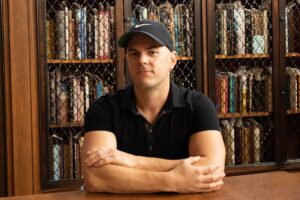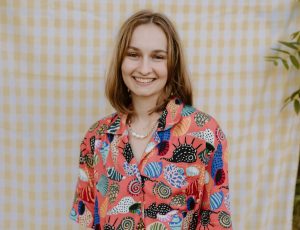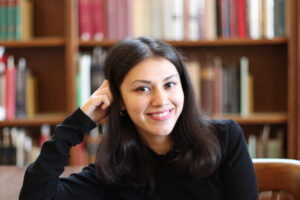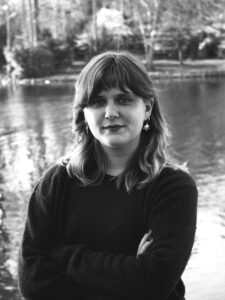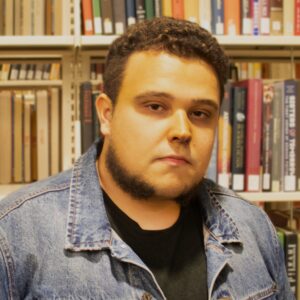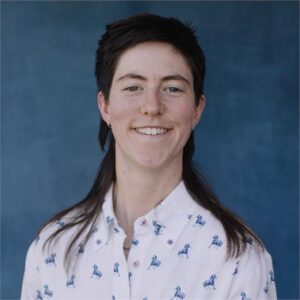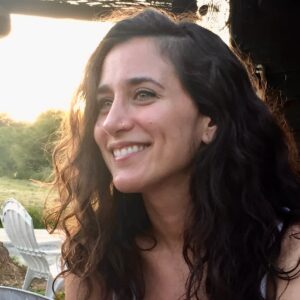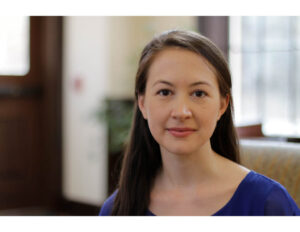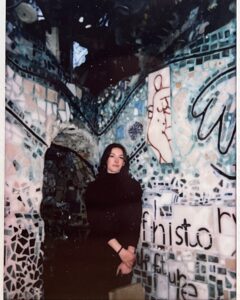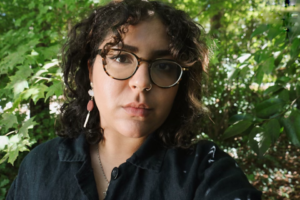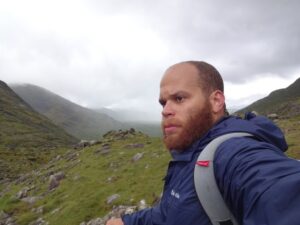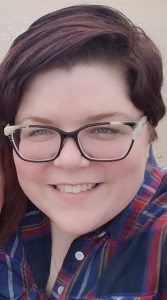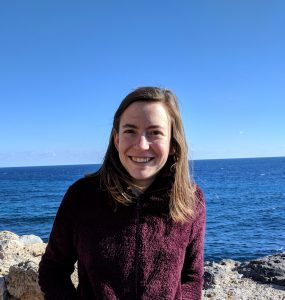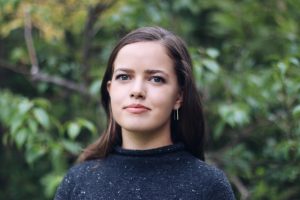Meet Our Latina/o Studies Teaching Fellowship Recipients
Spring 2024 Recipients:
Thomas Eric Simonson
Thomas Eric Simonson is a Ph.D. candidate in the Department of English and Comparative Literature at the University of North Carolina at Chapel Hill. Their research focuses primarily upon early modern literature, especially works engaging with concepts of cosmology at the intersection of literature and scientific writing. They also have interests in queer theory, film studies and visual art, and cultural studies.
Krista Telford
Krista Telford is a PhD student at the University of North Carolina, Chapel Hill studying English Literature. She specializes in medieval literature and is particularly focused on religious texts. Her research examines prayer and depictions of the afterlife in medieval literature. She aims to take an interdisciplinary approach to her study of religious writings, considering the performative aspect of many poems and prayers and drawing on musicological research.
Click Here to see Krista’s Humanities Unit on Horror and Supernatural fiction by Latinx writers.
Fall 2023 Recipients:
Sejal Mahendru
Sejal Mahendru was previously an LSP Fellow in Fall 2021. Their research focuses on environmental justice in the Anthropocene. Sejal am interested in the convergences in the fields of ecocriticism, post-colonial theory and global socioeconomics, to examine how the effects of climate change, displacement, toxic and electronic waste, and resource extraction are differentially experienced across the Global North and South. They are also interested in studying environmental advocacy through the intersections between art and activism in grassroots movements. They study global anglophone literature, with a focus on environmental justice movements in India and the U.S.A.
Click Here to see Sejal’s Social Sciences Unit on Environmental Justice and the Latinx Community.
Spring 2023 Recipients:
Rose Steptoe
Joshua Cody Ward
Joshua Cody Ward is a first-year English doctoral candidate. His interests include Literature of the American South, African American Literature, and Chicanx literature, especially across the 20th century. His work this Spring has brought him to conferences like SWPACA in Albuquerque and CEA in San Antonio. He has articles and chapters forthcoming in the Thomas Wolfe Review and South Atlantic Review later this year, as well as an essay on Cormac McCarthy’s new novels in 2024.
Click here to see Joshua Cody’s Humanities unit on close reading ChicanX short stories
Fall 2022 Recipients:
Izzy Howard
Izzy Howard (they/them) researches ambiguous and deceptive language in Medieval literature and how this ‘promiscuity’ of meaning can be read as queer. Their readings focus on the textual body and its relation to the physical body: how the textual corpus compares to the physical corpus, and how this relationship between language, text, and body can be queered. Medieval theories of language and rhetoric inform their investigation, alongside structuralist and post-structuralist criticism. Their broader interests include digital humanities, intersectional medievalisms and manuscript studies.
Click here to see Izzy’s Social Sciences Unit on border theories and aesthetics in film
Spring 2022 Recipients:
Nicole Berland
Nicole Berland (she/they) is a Doctoral Candidate and Teaching Fellow in the Department of English and Comparative Literature at Chapel Hill, where she is currently completing a dissertation on narrative seriality in contemporary science fiction television. She is especially passionate about her teaching, for which she has earned four university teaching awards and two external grants. Her auxiliary interests in social justice, music, visual art, and Spanish language learning keep her busy with a number of local, national, and international community groups.
Click here to check out Nicole’s Social Sciences Unit on LatinX public health infographics!
Anna Broadwell-Gulde
Anna Broadwell-Gulde (she/her) is a PhD candidate and teaching fellow in the Department of English and Comparative Literature at the University of North Carolina at Chapel Hill. Her research examines the influence of portraiture—painting and photographic—on modernist innovations in representations of consciousness. Prior to joining the English department, Anna lived and taught English in northern Brazil, where she fell in love with the people, culture, and dance. Through the LSP grant, she developed a writing-in-the-humanities unit that allows students to explore Latin cultures and identities through careful film analysis.
Click here to check out Anna’s Humanities unit on creating a film analysis podcast!
Krysten Voelkner
Krysten Voelkner (she/her) is a PhD candidate and teaching fellow in the department of English and Comparative Literature. Her primary interests reside at the intersection of environmental humanities and contemporary Latinx literature. Recent publications of hers can be found in Aztlán: A Journal of Chicano Studies, The Trumpeter: Journal of Ecosophy and Chiricú Journal: Latina/o Literatures, Arts, and Cultures. She is currently at work researching for her dissertation, which investigates the ways in which Latinx writers experiment with aesthetics of horror, dread, anxiety, and other ‘bad’ affects associated with the climate crisis. In this regard, she hopes to explore the affective ecologies of Latinx environmental literature, poetry, and film as they offer ways of thinking within and beyond the Anthropocene.
Click here to check out Krysten’s Natural Sciences unit on LatinX botanical epistemologies!
Fall 2021 Recipients:
Mindy Buchanan-King
Mindy Buchanan-King (she/her) is pursuing her Ph.D. in English Literature at UNC Chapel Hill and is a teaching fellow. Mindy is originally from Virginia and received her B.A. from Emory & Henry College and her M.A. from the College of Charleston. Her master’s thesis focused on Edith Wharton’s use of Romanticism in conceptualizing the artistic self in Hudson River Bracketed. Her graduate research is currently focused on questions of photography and medicine in late 19th-/early 20th-century U.S. literature, artistic conceptualizations and the history of “disfigurement,” and representations and interpretations of World War I les gueules cassées (“men with broken faces”) in wartime medical photography, art, prosthetic augmentation, illustrations, and narratives. She is pursuing the graduate certificate in Literature, Medicine, and Culture.
Mindy is a contributing editor for Iris: The Art and Literary Journal at UNC, is a co-coordinator of the Furst Forum, and is the recipient of a Latina/o Studies Teaching Award. She also volunteers as a transcriber on the original manuscript of Edith Wharton’s Hudson River Bracketed, for The Complete Works of Edith Wharton to be published by Oxford University Press.
Click here to check out Mindy’s Social Sciences unit on Latinx representation in photography!
Meleena Gil
Meleena Gil (they/she) is a PhD student, and teaching fellow in the department of English and Comparative Literature also earning a graduate certificate in Women’s and Gender Studies. Meleena’s research focuses on contemporary LatinX literature and cultural production, queer theory, and the environmental humanities. They are interested in botanical epistemologies, multispecies worldbuilding, survivance, and futurity. Outside of academia, Meleena is a nature enthusiast, a friend of strays, and a celebrator of quirks and kinks. They aim to create a space for meaningful experiences and mutual acknowledgment.
Sejal Mahendru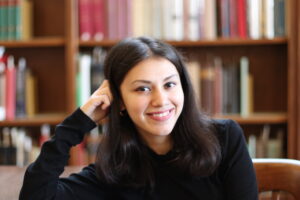
Sejal Mahendru‘s (she/her) research focuses on environmental justice in the Anthropocene. She is interested in the convergences in the fields of ecocriticism, post-colonial theory and global socioeconomics, to examine how the effects of climate change, displacement, toxic and electronic waste, and resource extraction are differentially experienced across the Global North and South. She is also interested in studying environmental advocacy through the intersections between art and activism in grassroots movements. Sejal studies global anglophone literature, with a focus on environmental justice movements in India and the U.S.A.
Click here to check out Sejal’s Humanities unit on Latina/o/x Sci-Fi!
Spring 2021 Recipients:
James Cobb
James Cobb is a PhD candidate and teaching fellow in the Department of English and Comparative Literature at the University of North Carolina at Chapel Hill. His research looks at the erasure of black subjectivity in contemporary fiction and the inherent difficulty of representing black life as both subject and object. He explores this relationship in evaluating the texts of Percival Everett and Paul Beatty through contemporary Social Ontology and Ordinary Language Philosophy.
Chloe Hamer
Chloe Hamer is a PhD student in the Department of English and Comparative Literature at UNC Chapel Hill. Her research centers around questions of collective memory, class, and political resistance in postcolonial Caribbean literatures, with a specific focus on the relationship between anti-global capitalist activism and literary form. Chloe’s dissertation aims to explore depictions of labor in contemporary Haitian and Haitian diasporic novels, examining the ways in which these novels make use of opaque narrative techniques to critique networks of neocolonial commodity production and consumption. Chloe has taught courses in the French and English departments at UNC; she has also been the recipient of a Foreign Language and Area Studies fellowship for the study of Haitian Kreyòl.
Click here to check out Chloe’s Writing in the Social Sciences Unit Assignment, on writing a policy brief for Student Action with Farmworkers (SAF).
Lindsay Ragle-Miller
Lindsay Ragle-Miller is currently a first-year PhD student at the University of North-Carolina at Chapel Hill, who teaches ENGL 105, the introductory composition course. In research, Lindsay is interested in Medieval Studies, particularly through the lenses of Disability Studies and Queer Studies. She earned a BA in English with Teacher’s Certification from Eastern Illinois University in 2009. Even then, Lindsay was interested in Medieval Studies, as one of the first students to earn an interdisciplinary minor in Medieval Studies. She taught high school English and Special Education for six years before returning to college to work on an MA. During Lindsay’s MA at Wayne State University, she continued the study of medieval literature, working closely with the resident medievalist Hilary Fox. Her master’s thesis, “’I Can So Just Sit Here and Cry’: Depression, Melancholy, and Acedia in John Gower’s Confessio Amantis,” explored the connections between mental disability and medical treatment in Confessio Amantis. Lindsay also presented at several conferences, the details of which are available on her CV page. While at Wayne State, she took several classes in early modern literature, focusing on Queer Theory, with Dr. Simone Chess. During two semesters, the class worked together to create “The Woman Warrior Project” website, a digital collection of Diane Dugaw’s thesis that collected and cataloged ballads about Women Warriors in the early modern period.
Click here to check out Lindsay’s Writing in the Social Sciences Unit Assignment, or here to view a list of texts associated with the Unit, on pre-Columbian and contemporary Latin American literature and culture.
Ellie Rambo
Eleanor Rambo is a PhD student in the Department of English and Comparative Literature at UNC-Chapel Hill, where she specializes in 20th and 21st-century American and Russian-language literature. Her work explores how literature functions as a marker of identity, as well as cultural and economic systems’ influence on the novel. Her writing has appeared in the publications World Literature Today and The Common, and she is currently the Managing Editor of The Carolina Quarterly.
Click here to check out Ellie’s Writing in the Natural Sciences Unit Assignment on Science Reporting with a Latina/o Studies Focus.
Carly Schnitzler
Carly Schnitzler is a PhD candidate and teaching fellow in the Department of English and Comparative Literature at the University of North Carolina at Chapel Hill. Currently writing a dissertation on the rhetorics and poetics of automation, her research and writing focuses more broadly on the intersections of rhetoric, experimental poetics, labor practices, and digital infrastructures. Her scholarly work has been published or is forthcoming in electronic book review, Textshop Experiments, The CEA Critic, and The Geography Teacher, among other publications.
Click here to check out Carly’s ENGL 105i Writing in the Digital Humanities Unit Assignment, on Dominican-American writers and narrative choice.
Fall 2020 Recipients:
Jo Klevdal
Jo Klevdal is a PhD student in the Department of English and Comparative Literatures where she studies 20th century literature. Her primary interests relate to various understandings of memory and their relationship to both language and image. For her current work, she examines the intersection of photography and literature in the early 20th century. Jo is originally from Colorado and holds a M.A. from the University of Colorado, Boulder.
Click here to check out Jo’s Writing in the Social Sciences Unit Assignment, focused on Latina/o Immigration.
emilio Jesús Taiveaho Peláez
emilio Jesús Taiveaho Peláez is a first-generation migrant and a PhD. student—in that order—through the Department of English & Comparative Literature at the University of North Carolina- Chapel Hill. As both poet and scholar, their work engages the intersection of aesthetic experience and political discipline, blending critical, creative, and archival inquiry. Focusing on 20th-century experimental poetry, their dissertation (tentatively titled Ojos de Hierba: Walt Whitman’s Children & the American Lyric) probes a shared subterranean literary and philosophical history in the Américas through the lens of Neobaroque aesthetics, tracing dissonant and dissident relations in the life and work of figures such as Federico García Lorca, Langston Hughes, Allen Ginsberg, Néstor Perlongher, and Cecilia Vicuña. emilio’s first book of poetry, landskips (words are a hard look), a latinX reconnaissance of the sonics and optics of our contemporary USAmerican physical and imaginative landscapes, is forthcoming through The Concern Newsstand.
Click here to check out emilio’s Writing in the Social Sciences Unit Assignment, focused on songs affiliated with social movements.
Nikki Roulo
Nikki Roulo is a Ph.D. Candidate in the Department of English and Comparative Literature at the University of North Carolina at Chapel Hill. Her research focuses primarily upon early modern literature and in particular, the intersections of poetics and performance, the fool figure, ballads and politics.
Click here to check out Nikki’s Writing in the Social Sciences Unit Assignment, focused on Latina/o cultural practices.
Leslie Rowen
Leslie Rowen is a third year PhD student in the Department of English and Comparative Literature. There, she focuses on 20th Century American Literature of War, especially soldier writings composed during wartime. In 2017, she received her B.A. in English and Spanish from Bellarmine University in Louisville, KY. During her time at Bellarmine, she studied for a semester at the Universidad San Francisco de Quito in Quito, Ecuador, where she took classes in Spanish and Ecuador’s history. Between her time at USFQ and Bellarmine, she also took several classes on Latin film, which will be the focus of her English 105 Humanities Unit. Some of her favorites are Pablo Larraín’s No and Tania Hermida’s Qué Tan Lejos. She is eager to share these films with her students, hear their perspectives, and help them create dynamic visual essays using Adobe Spark.
Click here to check out Leslie’s Writing in the Humanities Unit Assignment, focused on Latinx Film.
Krysten Voelkner
My primary interests reside at the intersection of environmental humanities and contemporary LatinX literature. Topics which I find exciting relate to the rhetoric of environmental advocacy, the myriad of emotional responses to the threat of climate change, and the ways in which LatinX writers and artists create environmental epistemologies through their works.
Click here to check out Krysten’s Writing in the Humanities Unit Assignment, focused on Latinx Detective Fiction.


